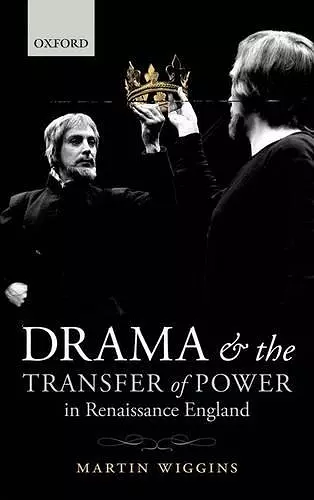Drama and the Transfer of Power in Renaissance England
Format:Hardback
Publisher:Oxford University Press
Published:2nd Aug '12
Currently unavailable, and unfortunately no date known when it will be back

The state is at its most volatile when supreme power changes hands. This book studies five such moments of transfer in the sixteenth and early seventeenth centuries, from Henry VIII to the English Revolution, pazying particular attention to the political function and agency of drama in smoothing the transition. Masques and civic pageants served as an art form by which incoming authority could declare its power, and subjects could express their willing subordination to the new regime. The book contains vivid case studies of these dramatic works, some of which have never before been identified, and the circumstances for which they were written: the use of London street theatre in 1535 to promote Henry VIII's arrogation of Royal Supremacy; the aggressively Protestant court masque of 1559 which marked the accession of Elizabeth I, and the censorship which resulted when the same mode of dramatic discourse spread to more plebeian stages; the masques and entertainments of James I's initial year on the English throne, through which the new Stuart dynasty asserted its legitimacy and individual courtiers made their bids for influence; and the formal coronation entry to London, furnished with dramatic pageants, which London paid for but Charles I refused to undertake. The final chapter describes how, in 1642, a very different incoming regime planned to ignore drama altogether, until some surprisingly contingent circumstances forced its hand.
Much of the book is arcane literary detective work but no less fascinating for that, extending our sense of what constituted drama in Renaissance England, and how it could be used to massage public opinion as power shifted from one regime to another. * Nicholas Grene, Modern Language Review *
The author presents impressive archival details of little-known ceremonies, processions, and semi-theatrical events through which rulers and subjects negotiated power relationships. * C. Baker, Choice *
Wigginss study Drama and the Transfer of Power, meanwhile, is an example of how the catalogues wealth of information might be exploited ... Wiggins shows how much we can learn about shows for which there is no surviving text by piecing together information about their physical construction, the reactions of spectators and the immediate political context. * Lois Potter, Times Literary Supplement *
A simulating and enlightening study of works that the author has brought back into the light. * Andrew Hadfield, Around the Globe *
Drama and the Transfer of Power is a genuine contribution to our understanding of how theatrical performances were used as platforms for and instruments of early modern politics ... a timely reminder of how deeply drama and monarchy were intertwined in the early modern period. * Kirsten Sandrock, Shakespeare Jahrbuch *
expansive in its implications ... Wiggins's exacting reconstructions of the political context and epistemological status of these and other courtly performances correct the fieldâs bias toward both Shakespeare and the public theater while asking us to rethink drama as a category. * Julia Reinhard Lupton, SEL Studies in English Literature 1500-1900 *
ISBN: 9780199650590
Dimensions: 222mm x 151mm x 16mm
Weight: 350g
164 pages